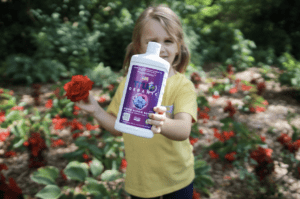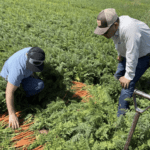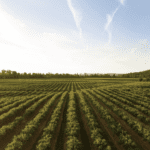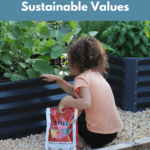September 27, 2023
Living Our True Organic Sustainable Values
Living Our True Organic Sustainable Values
Sustainability is woven into everything we do at True Organic, from the foundation of our mission to the powerful natural ingredients in each bag.
Every year, we advance our carbon-negative trajectory by delivering millions of pounds of enriching carbon to agricultural soils.As a 20-year-old family owned company with deep roots in organic agriculture, we’ve always had an eye on what “sustainability” really means — and what it means to be in the business of planetary health. What’s certain is that sustainability isn’t summed up in any simple action or any single product. By approaching sustainability as a complex web of long-term practices and staying adaptable to ever-changing climate needs, we can have a powerful impact on healing the planet.
Our founder, Jake Evans, launched the True mission to heal the nation’s soil by making high-quality organic fertilizer for American farmers. Let’s explore how we’re staying true to our promise 20 years later.
We rescue powerful agricultural ingredients from the waste stream.

In a way, our dedication to sustainability is right there in the bottle or bag: valuable natural materials that would otherwise become unused landfill waste (or be left to contaminate waterways and natural habitats), repurposed and processed into safe, effective, earth-friendly plant foods.
We use ingredients from agricultural processing like poultry manure, bone, blood, egg shells, shrimp shells, and other kinds of “waste” — yep, we’re turning what most people consider waste into plant food that nourishes the planet and your garden. How’s that for sustainability?
We also get byproducts from plant-based ingredients like reduced sugar molasses and corn steep liquor from beet sugar production and corn wet-milling.
These ingredients are captured before they enter a waste stream. This process not only eliminates unusable waste, it also means that True products are harnessing nature’s own best supplements to nourish soil.
By diverting valuable natural materials from landfills or waterways, we contribute to a circular economy where materials never become waste, and nature’s power gets to live on, regenerated as a soil-loving boost to your garden.
Plus: Our entire operation line is zero-waste and we focus on bioprocessing (as opposed to synthetic chemical manufacturing).
We’re supported by a team of scientists with expertise in planetary health and sustainable food production.

Our field and lab research and our product development is backed by scientists and farmers with deep knowledge about soil health and sustainability. Our R&D team partners with the growers who use True to optimize organic fertilizer programs for a wide range of crops, spanning the Western United States and Baja Mexico. From organic apple production in Washington to organic almond production in California’s Central Valley and organic strawberry production on California’s Southern Coast.
These in-house teams of experts in agronomy, chemistry, and food safety ensure that our practices are grounded in science and aligned with our commitment to overall sustainability, waste reduction, and soil regeneration. Meet our R&D Team!
True Organic plant foods promote the wide-ranging planetary benefits of organic growing.
The most obvious way we commit to sustainability is through our products and their impact on climate health. How does organic agriculture contribute to the planet’s health? We’re glad you asked!
Compared to conventional agriculture, organic growing methods:
- Provide carbon and an energy source for soil microbes, helping them do the amazing work of making soil a living web that sustains life on our planet
- Make soil easier to work, helping farmers grow more food with less effort and additives
- Reduce the negative environmental effects of pesticides, heavy metals, and other pollutants
- Increase soil’s ability to properly retain and drain water, reducing runoff and flooding
- Encourage better plant root development and penetration, making crops healthier and hardier
- Help soil trap carbon from the atmosphere (read more about carbon sequestration)
- And supply, store, and retain nutrients that plants need most, supporting plant health — and therefore planetary health. It’s all connected!
Curious about how it all works? Read more about how organic and regenerative farming techniques can save the soil that can save our planet.
We stay adaptable and future-minded, continuing to research even more impactful sustainability efforts.

That means committing to long-term views and plans that have room for both determination and adaptability. As we continue to grow and learn about our impact on the environment, we’re constantly updating our practices and sustainability commitments.
What does that mean in recent years and going forward? Here’s how we’re deepening our sustainability commitment right now:
- We’re working with new ingredients like biochar to promote regenerative organic agriculture, not only improving soil health but also storing sequestered carbon in the soil for over 1000 years.
- As we expand our production facilities to keep making premium organic fertilizer for more growers big and small, we’re putting more attention on measuring and tracking our facilities’ carbon footprint — and downsizing it.
- We hope to keep influencing the larger agricultural sector by making it easier for farmers to use organic and regenerative farming practices, as well as pressing for organic policy and expansion.
When we talk about innovative, sustainability practices, that’s what we do every day at True Organic: by “making organics work” for the farmers who grow our food to the backyard gardeners who just discovered their love of soil.
Show us your True Organic Plants
#GrowWithTrue
www.trueorganic.earth


